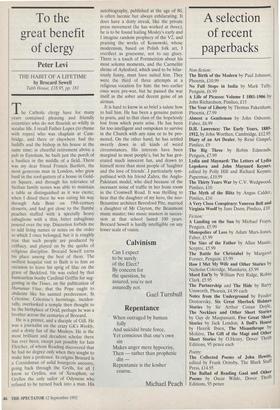To the great benefit of clergy
Peter Levi
THE HABIT OF A LIFETIME by Brocard Sewell Tabb House, £18.95, pp. 181 The Catholic clergy have for many years contained pleasing and friendly eccentrics who do not flourish so wildly in secular life. I recall Father Lopes (to rhyme with ropes) who was chaplain at Cam- bridge, and there or elsewhere had the bailiffs and the bishop in his house at the same time; in cheerful retirement above a pub in Eynsham, he built just the porch of a basilica in the middle of a field. There was my dear friend Francis Bartlett, the most generous man in London, who grew basil in the roof-gutters of a house in Gold- en Square, and through his tolerance of Sicilian family noises was able to maintain a table as distinguished as it was exotic; when I dined there he was eating his way through Ada Boni on 19th-century desserts, and had got close to the flambe peaches stuffed with a specially heavy zabaglione with a thin, bitter zabaglione poured over the top. Discretion forbids me to add living names or notes on the order to which I once belonged, but it is roughly true that such people are produced by celibacy, and played on by the quirks of religious discipline. Brocard Sewell earns his place among the best of them. The swiftest hospital visit to Bath is to him an occasion to leave his sprig of lilac on the grave of Beckford. He was exiled by that humourless booby Cardinal Griffin for sug- gesting in the Times, on the publication of Humanae Vitae, that the Pope ought to abdicate like his sainted predecessor, St Celestine. Celestine's hermitage, inciden- tally, overlooked a temple then thought to be the birthplace of Ovid; perhaps he was a brother across the centuries of Brocard.
He is a printer, and a disciple of Gill. He was a journalist on the crazy GK'S Weekly, and a dotty fan of the Mosleys. He is the most brilliant and decadent scholar there has ever been, except just possibly for lain Fletcher, of whom Reading discovered that he had no degree only when they sought to make him a professor. In origins Brocard is a Cornishman of solid bourgeois ancestry, going back through the Grylls, for all I know to Gryllos, son of Xenophon, or Gryllos the only sailor of Odysseus who refused to be turned back into a man. His
autobiography, published at the age of 80, is often laconic but always exhilarating. It does have a dotty streak, like the private press movement (he has worked at three); he is to be found hailing Mosley's early and imagine random prophecy of the V2, and praising the works of Kossowski, whose modernism, based on Polish folk art, I recollect as gruesome, not to say gluey. There is a touch of Portmeirion about his most solemn moments, and the Carmelite shrine of Aylesford, which used to be hilar- iously funny, must have suited him. They were the third of three attempts at a religious vocation for him: the two earlier ones were pre-war, but he passed the war itself in the sober and decent guise of an airman.
It is hard to know in so brief a salute how to hail him. He has been a genuine patron to poets, and to that class of the hopelessly lost from which poets arise. He has been far too intelligent and outspoken to survive in the Church with any ease or to be pro- moted. On the other hand, he has settled sweetly down in all kinds of weird circumstances. His interests have been marginal to most people's, but he has gen- erated much innocent fun, and drawn to himself more than most people of 'laughter and the love of friends'. I particularly sym- pathised with his friend Zahra, the Anglo- Pakistani model, who died because of the incessant noise of traffic in her front room in the Cromwell Road. It was thrilling to hear that the daughter of my hero, the neo- Byzantine architect Beresford Pite, married a daughter of Mr Clayton, the Beaumont music master; two music masters in succes- sion at that school lasted 100 years. Brocard Sewell is hardly intelligible on any lesser scale of vision.


































































 Previous page
Previous page